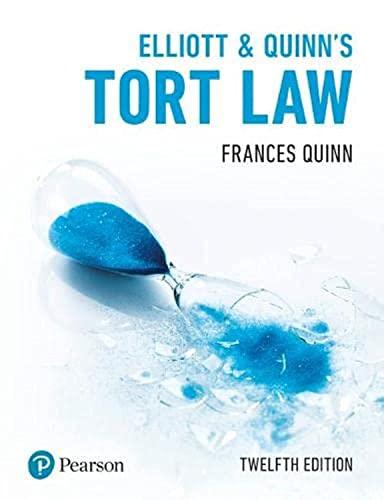Question
1.Which form of compensation is a partner entitled to receive from a partnership? A.Reasonable salary for work performed. B.Fair market value for services rendered. C.A
1.Which form of compensation is a partner entitled to receive from a partnership?
A.Reasonable salary for work performed.
B.Fair market value for services rendered.
C.A share of partnership profits.
D.A reasonable management fee for managing the business.
2.In Finch v. Raymer, the court ruled that the plaintiff and defendant had formed a partnership to renovate real property because:
A.Title to the real property was held in the names of both parties.
B.Defendant had drafted the partnership agreement and therefore any ambiguity regarding the parties' relationship had to be construed against her.
C.Plaintiff proved that the parties had agreed to combine their assets, labor, and skill with the understanding that profits would be shared between them.
D.All of the above.
3.In Pappas v. Tzolis, the New York Court of Appeals ruled that the defendant could not be held liable for breach of fiduciary duty because:
A.He was a limited partner.
B.The plaintiffs' own allegations demonstrated that during the relevant period they could no longer regard defendant as trustworthy.
C.The plaintiffs' own allegations demonstrated that during the relevant period defendant had satisfied his fiduciary duties to them.
D.Plaintiffs had failed to make their capital contributions and therefore lacked standing to sue.
4.Which of the following is NOT a characteristic of a limited liability company ("LLC")?
A.Members are jointly and severally liable for all LLC obligations.
B.Members of an LLC may elect to have the LLC treated as a partnership or corporation for income tax purposes.
C.An LLC may be member-managed or manager-managed.
D.An LLC may only be formed in accordance with a statute authorizing the formation of such entities.
5. Which of the following statements is NOT true about a limited partnership?
A.A limited partnership must have at least one general partner and one limited partner.
B.Limited partners owe the limited partnership a fiduciary duty.
C.General partners have unlimited liability for obligations of the limited partnership.
D.A limited partner has no right to manage the business of the partnership
Step by Step Solution
There are 3 Steps involved in it
Step: 1

Get Instant Access to Expert-Tailored Solutions
See step-by-step solutions with expert insights and AI powered tools for academic success
Step: 2

Step: 3

Ace Your Homework with AI
Get the answers you need in no time with our AI-driven, step-by-step assistance
Get Started


